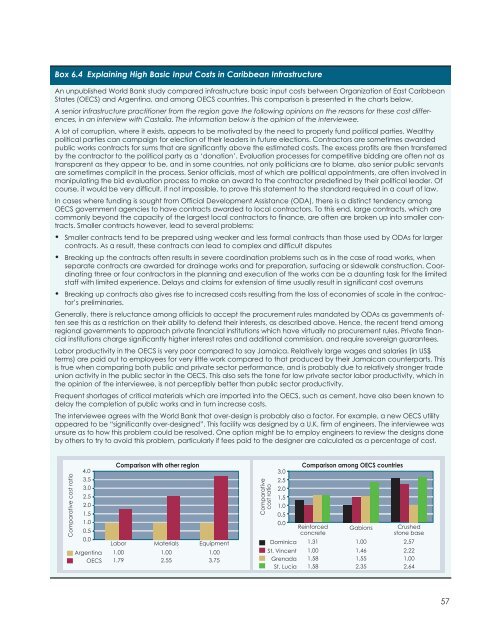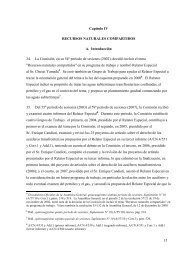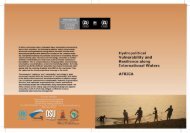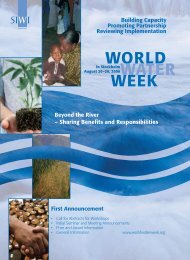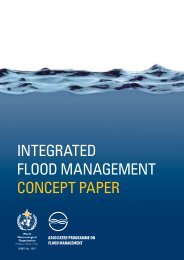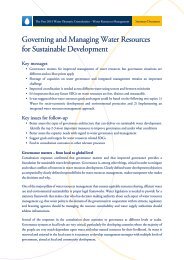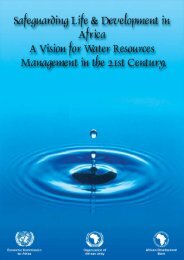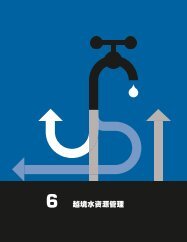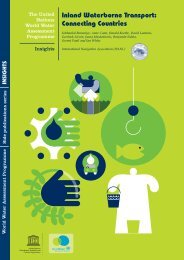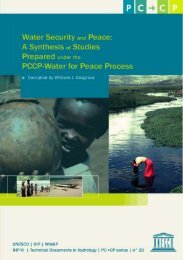A Sourcebook - UN-Water
A Sourcebook - UN-Water
A Sourcebook - UN-Water
You also want an ePaper? Increase the reach of your titles
YUMPU automatically turns print PDFs into web optimized ePapers that Google loves.
Box 6.4 Explaining High Basic Input Costs in Caribbean Infrastructure<br />
An unpublished World Bank study compared infrastructure basic input costs between Organization of East Caribbean<br />
States (OECS) and Argentina, and among OECS countries. This comparison is presented in the charts below.<br />
A senior infrastructure practitioner from the region gave the following opinions on the reasons for these cost differences,<br />
in an interview with Castalia. The information below is the opinion of the interviewee.<br />
A lot of corruption, where it exists, appears to be motivated by the need to properly fund political parties. Wealthy<br />
political parties can campaign for election of their leaders in future elections. Contractors are sometimes awarded<br />
public works contracts for sums that are significantly above the estimated costs. The excess profits are then transferred<br />
by the contractor to the political party as a ‘donation’. Evaluation processes for competitive bidding are often not as<br />
transparent as they appear to be, and in some countries, not only politicians are to blame, also senior public servants<br />
are sometimes complicit in the process. Senior officials, most of which are political appointments, are often involved in<br />
manipulating the bid evaluation process to make an award to the contractor predefined by their political leader. Of<br />
course, it would be very difficult, if not impossible, to prove this statement to the standard required in a court of law.<br />
In cases where funding is sought from Official Development Assistance (ODA), there is a distinct tendency among<br />
OECS government agencies to have contracts awarded to local contractors. To this end, large contracts, which are<br />
commonly beyond the capacity of the largest local contractors to finance, are often are broken up into smaller contracts.<br />
Smaller contracts however, lead to several problems:<br />
• Smaller contracts tend to be prepared using weaker and less formal contracts than those used by ODAs for larger<br />
contracts. As a result, these contracts can lead to complex and difficult disputes<br />
• Breaking up the contracts often results in severe coordination problems such as in the case of road works, when<br />
separate contracts are awarded for drainage works and for preparation, surfacing or sidewalk construction. Coordinating<br />
three or four contractors in the planning and execution of the works can be a daunting task for the limited<br />
staff with limited experience. Delays and claims for extension of time usually result in significant cost overruns<br />
• Breaking up contracts also gives rise to increased costs resulting from the loss of economies of scale in the contractor’s<br />
preliminaries.<br />
Generally, there is reluctance among officials to accept the procurement rules mandated by ODAs as governments often<br />
see this as a restriction on their ability to defend their interests, as described above. Hence, the recent trend among<br />
regional governments to approach private financial institutions which have virtually no procurement rules. Private financial<br />
institutions charge significantly higher interest rates and additional commission, and require sovereign guarantees.<br />
Labor productivity in the OECS is very poor compared to say Jamaica. Relatively large wages and salaries (in US$<br />
terms) are paid out to employees for very little work compared to that produced by their Jamaican counterparts. This<br />
is true when comparing both public and private sector performance, and is probably due to relatively stronger trade<br />
union activity in the public sector in the OECS. This also sets the tone for low private sector labor productivity, which in<br />
the opinion of the interviewee, is not perceptibly better than public sector productivity.<br />
Frequent shortages of critical materials which are imported into the OECS, such as cement, have also been known to<br />
delay the completion of public works and in turn increase costs.<br />
The interviewee agrees with the World Bank that over-design is probably also a factor. For example, a new OECS utility<br />
appeared to be “significantly over-designed”. This facility was designed by a U.K. firm of engineers. The interviewee was<br />
unsure as to how this problem could be resolved. One option might be to employ engineers to review the designs done<br />
by others to try to avoid this problem, particularly if fees paid to the designer are calculated as a percentage of cost.<br />
Comparative cost ratio<br />
4.0<br />
3.5<br />
3.0<br />
2.5<br />
2.0<br />
1.5<br />
1.0<br />
0.5<br />
0.0<br />
Comparison with other region<br />
Labor Materials Equipment<br />
Argentina 1.00 1.00 1.00<br />
OECS 1.79 2.55 3.75<br />
Comparative<br />
cost ratio<br />
3.0<br />
2.5<br />
2.0<br />
1.5<br />
1.0<br />
0.5<br />
0.0<br />
Comparison among OECS countries<br />
Reinforced<br />
concrete<br />
Gabions<br />
Crushed<br />
stone base<br />
Dominica 1.31 1.00 2.57<br />
St. Vincent 1.00 1.46 2.22<br />
Grenada 1.58 1.55 1.00<br />
St. Lucia 1.58 2.35 2.64<br />
57


